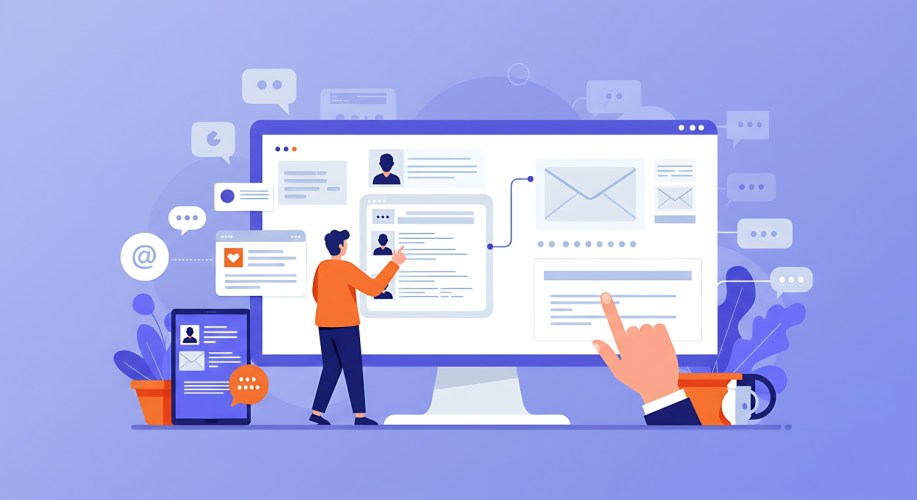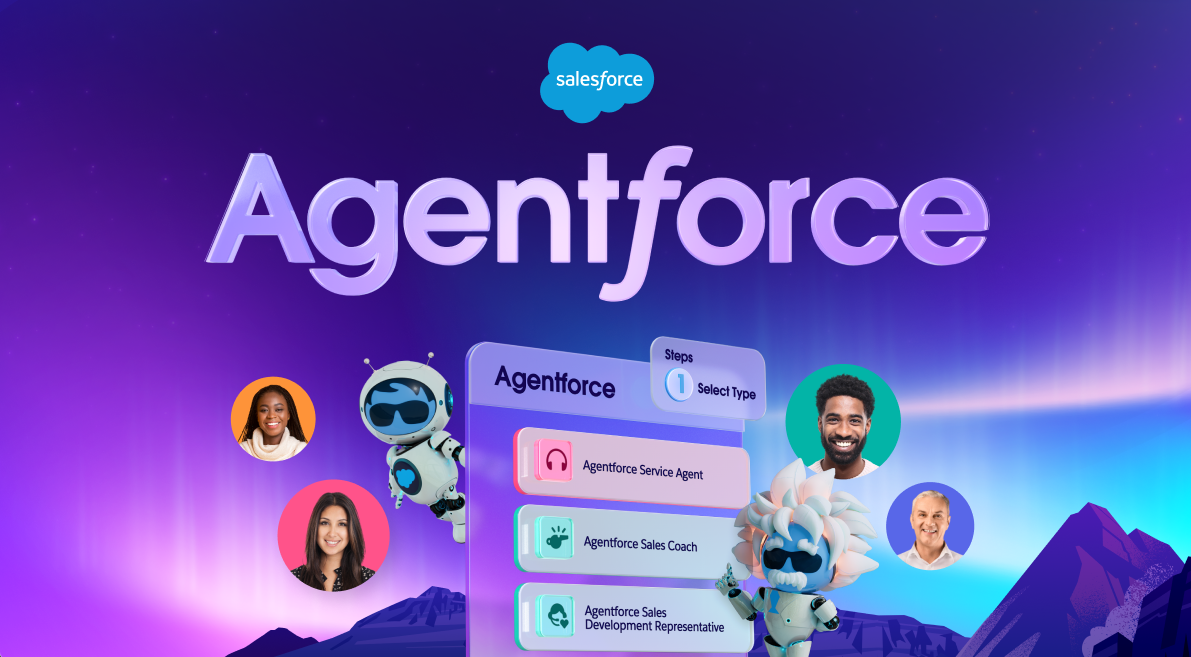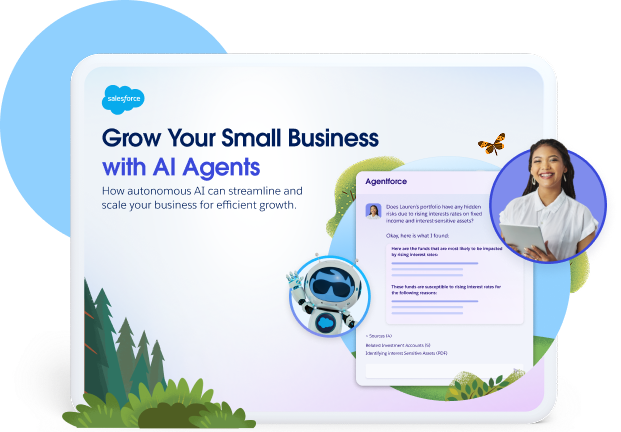Most of us imagine artificial intelligence (AI) as this flashy thing — robots answering phones or digital assistants that sound like your favorite sci-fi movie. But in reality? AI is a lot less dramatic and a lot more helpful. It’s the quiet digital worker who remembers every customer detail and works 24/7 without complaining. Not as exciting as an adventure with a robot, but way more useful.
What’s changing now is the way AI shows up in everyday work. It acts more like a teammate now than a tool. And startups are putting it to work in all kinds of smart ways. According to the latest Small and Medium Business Trends Report, startups are 1.8x more likely to invest in AI than their declining peers. The ones growing fastest see AI as their competitive edge. And much of that edge comes from how agentic AI is doing the hard work in the background. In this blog, we’ll walk you through the most useful ways startups are putting agentic AI to work. Let’s dig in.
What you’ll learn:
- Quick definition of agentic AI
- Top 10 Agentic AI use cases for small businesses
- Bringing it all together with Agentforce 360
Quick definition of agentic AI
Agentic AI is a type of smart intelligence that, when trained, can take action on its own to complete tasks from start to finish. Unlike predictive AI that offers suggestions, agentic AI is trained to actually do the work. By using AI agents — autonomous systems trained to understand context, follow instructions, and make decisions — small business owners are seeing big results.
So where does it live? Agentic AI lives right inside your customer relationship management (CRM) tool. It’s part of what we call the agentic layer — an intelligent system that connects to your business data and tools. Once an AI agent is trained to reach a goal, it will figure out the steps and finish the task without constant inputs. It never sleeps, and doesn’t miss any details.
Why agentic AI matters for startups
Agentic AI is a practical shift in how work gets done, especially for teams that need to do more with less. Here’s how building and training an AI agent makes all the difference for startups.
AI Tools for Small Business
Scale with limited resources
When you’re not ready to grow your team but still need more output, agentic AI fills in the gaps. It handles repeatable work like logging notes or sending follow-ups so your small team can focus on closing deals.
Works 24/7 without extra management
Once these agents are trained, they don’t need reminders or approvals. They run in the background 24/7, handling routine tasks, helping your business keep moving while you’re off the clock.
Connects your tools for better team alignment
Agentic AI moves information between your apps automatically by connecting your tools and sharing updates across them in real time. Emails, messages, tasks, and updates stay in sync without anyone needing to copy-paste or follow up manually. Everyone stays informed and one step ahead.
With that foundation in place, let’s look at ten agentic AI use cases that show how startups are already putting it to work.
Top 10 Agentic AI use cases for small businesses
Use case #1: Agentic AI in sales meeting prep
Sales meetings often fail not because of the pitch, but because the prep is rushed. Your team spends valuable time searching through old emails, putting together notes, or trying to remember what was discussed in the last call. That scramble makes it harder to walk in with confidence and build trust with a prospect.
Agentic AI changes that prep work from a scramble into a strategy. An AI agent can gather all the context you need to walk into each meeting with a clear view. It pulls in recent conversations and deal updates, then organizes them into a clear summary. It surfaces the highlights you need: unanswered questions, deal risks, or great wins from earlier conversations. And because it lives in your CRM, you get all that info in one place without switching apps or screens.
Use case #2: Agentic AI for creating close plans
Close plans are basically roadmaps you build with your buyer. They spell out the steps both sides need to take to move the deal to the next stage. Why do they matter? Because buying decisions are rarely made by one person. Your main contact might be excited about your product, but they’ll probably need buy-in from their boss, finance, legal, or even IT. Without a clear plan, deadlines move and interest fades.
Agentic AI fixes that. Based on your CRM data, it builds a personalized roadmap for how to close the opportunity. You ask. It responds with a plan. You could say something like “Write steps to close the [Opportunity Name],” and the agent will generate a focused, step-by-step close plan grounded in what your deal looks like right now. It can suggest who to follow up with and highlight what is missing in your sales pipeline. You end up with a tidy checklist that keeps things moving forward.
The Guide to AI for Small Business
Breaking down artificial intelligence (AI) and how you can incorporate it into your growing business in this free guide.



Use case #3: Agentic AI for summarizing similar cases
What if your service team could quickly spot patterns and unlock what worked before, without going through dozens of past support tickets? With agentic AI, you can. The agentic AI scans your CRM and knowledge base, then pulls up similar case histories (fast) and turns them into savvy summaries you can actually use.
You could ask questions like, “How were high-priority cases handled today?” or “What solved critical issues this week?” The AI responds with a snapshot of common trends, resolution steps, and relevant case context. For small and medium-sized businesses (SMBs) that don’t have large support teams on standby, this is a real win. It speeds up resolution and helps your team spot what’s working (and what’s not) without extra effort.
Use case #4: Agentic AI for product recommendations
Recommending the right product at the right moment has always been tricky. Too generic and you risk losing a customer’s interest. Too specific and you may miss what they actually need. Agentic AI looks at what a customer has bought before, what they’re browsing, and even patterns in your industry to suggest ideas that make sense in the moment. Here’s how agentic AI makes product recommendations work for you.

Here’s why it matters for small teams:
- Less guesswork: Get clear upsell and cross-sell ideas right away.
- Fewer clicks: Suggestions show up where you work, so no extra tab hopping.
- Faster learning: Your team picks up the right products and patterns on the job.
Grow Your Small Business With AI Agents
Learn how autonomous AI can scale your small business for efficient growth in our free e-book.
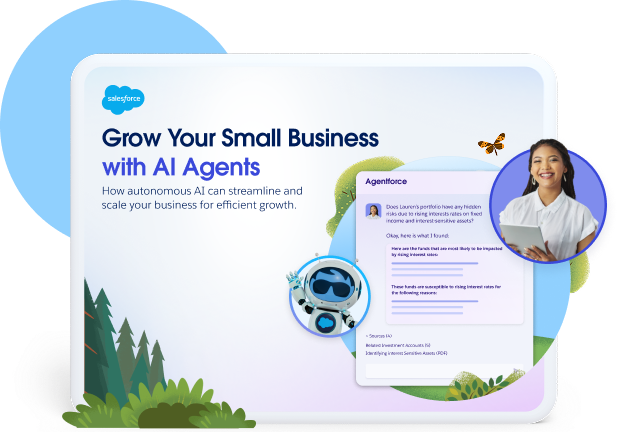
Use case #5: Agentic AI in transaction disputes
Transaction disputes can drag down customer trust if they take too long. Every day a customer waits is a day their frustration grows. Agentic AI can speed up the process and make it less painful for both customers and teams. It quickly pulls transaction data and customer history, then helps you craft personalized messages when acknowledging a dispute or resolving it.
On top of that, you can trigger helpful actions with simple prompts. For example, you might say “reverse a fee for [account name]” and the agent pulls relevant transactions and creates a case. It can even kick off email updates within the same interface. This keeps the process swift and consistent, especially when your team is busy. Customers get faster answers and feel taken care of. And your team avoids friction.
Use case #6: Agentic AI for personalized upselling
Successful upselling often means offering upgrades that actually help your customers succeed. That means recognizing when they’re ready for the next level and making it easy for them to say yes.
With agentic AI, you don’t have to rely on assumptions. The AI watches usage in real time and gently nudges when a customer could benefit from more value. It may send an alert to your sales team (or even pop up an in-app notification or an email) suggesting an upgrade when service usage hits or exceeds defined benchmarks. Here’s how it helps:
- Keeps revenue flowing: AI finds natural upsell moments based on real customer behavior. Upgrades feel helpful, not forced.
- Saves time on tracking: Set your rules once, and the agent does the monitoring for you. It alerts your team or nudges customers when action is needed.
- Offers smarter service: Personal suggestions show customers you understand their needs. That builds trust and keeps them coming back.
Build your own custom solution
Learn how to create prompts for your business needs and bring them into the flow of work in this free guide.




Use case #7: Agentic AI for team communications
As your business grows, communication becomes more complex. Messages get lost in long threads. People join conversations late. And finding that one important file from last week? Not so easy. That’s why many startups are now turning to agentic AI to simplify team communication.
With AI-integrated tools like Slack, AI agents help your team stay organized without chasing messages or repeating updates. Let’s say a team member misses a long conversation. The AI can instantly summarize the thread, highlighting key points, so they can catch up in seconds. During meetings, it captures notes automatically and shares them afterward. No need to write things down or worry about what was missed.
Slack channels, built into Salesforce CRM, help small businesses and startups manage customers and internal work better. They bring communication and customer data together, so employees don’t need to switch apps, making work more productive. They also create a foundation for AI to work better. AI agents can jump in to handle tasks like drafting sales proposals or resolving customer issues, while teams stay focused on high-value work. The result is faster collaboration and a customer experience that feels consistent from start to finish.
Boost team productivity with Slack
Bring together your team, your customers, and your tools to help take your business to the next level with Slack — it’s where business gets done.

Use case #8: Agentic AI for forecasting summary
Forecasting is one of those jobs that always feels part science, part guesswork. Sales leaders spend hours digging into spreadsheets, trying to spot trends and figure out where to focus next. It’s important work, but it often takes longer than it should. By the time you’ve spotted the issue, the moment to act may have already passed.
Agentic AI helps reduce that delay by pulling all the forecast data into a clear summary. It highlights where numbers are strong and flags dips before they become problems. It even points out areas where upselling could make a difference. The result? Leaders can tap into real-time insights they can act on right away, removing the uncertainty from decision-making.
Use case #9: Agentic AI for generating price quotes
Creating quotes can be one of the most time-consuming parts of a sales process. If you sell across multiple locations or offer bundles of services, you know how tricky it is to gather the right details and make sure the pricing is accurate. That usually means lots of manual data entry and delays that slow down deals.
Agentic AI guides your team through a conversation and pulls in the data it already knows from your CRM. From there, it can recommend the right products and map serviceability to the right fields. It can generate a quote that’s accurate and ready to share. Here’s how it can help you:
- Faster quotes: AI collects details and fills out fields automatically, so your team doesn’t waste time copying data across systems.
- Product recommendations: Based on customer needs, AI suggests the right mix of products or services, making your quote feel tailored and relevant
- Less friction: Your team can get everything in one guided workflow. That means customers get answers fast, and deals move forward faster.

Use case #10: Agentic AI for inventory management
Keeping track of inventory always sounds simple until you try to do it. Field teams are managing trucks and load documents, while supervisors are trying to make sense of what’s expected versus what’s actually on hand. Small mistakes can add up fast, leading to lost stock and frustrated customers.
Agentic AI takes the stress out of the process by automatically summarizing inventory status in real time. It shows you what was expected, what actually went out, and where the gaps are. Maybe stock was left on the truck. Maybe it never made it into the load sheet. You no longer need to piece the story together yourself. You get a clear summary in seconds and can fix issues before they snowball.
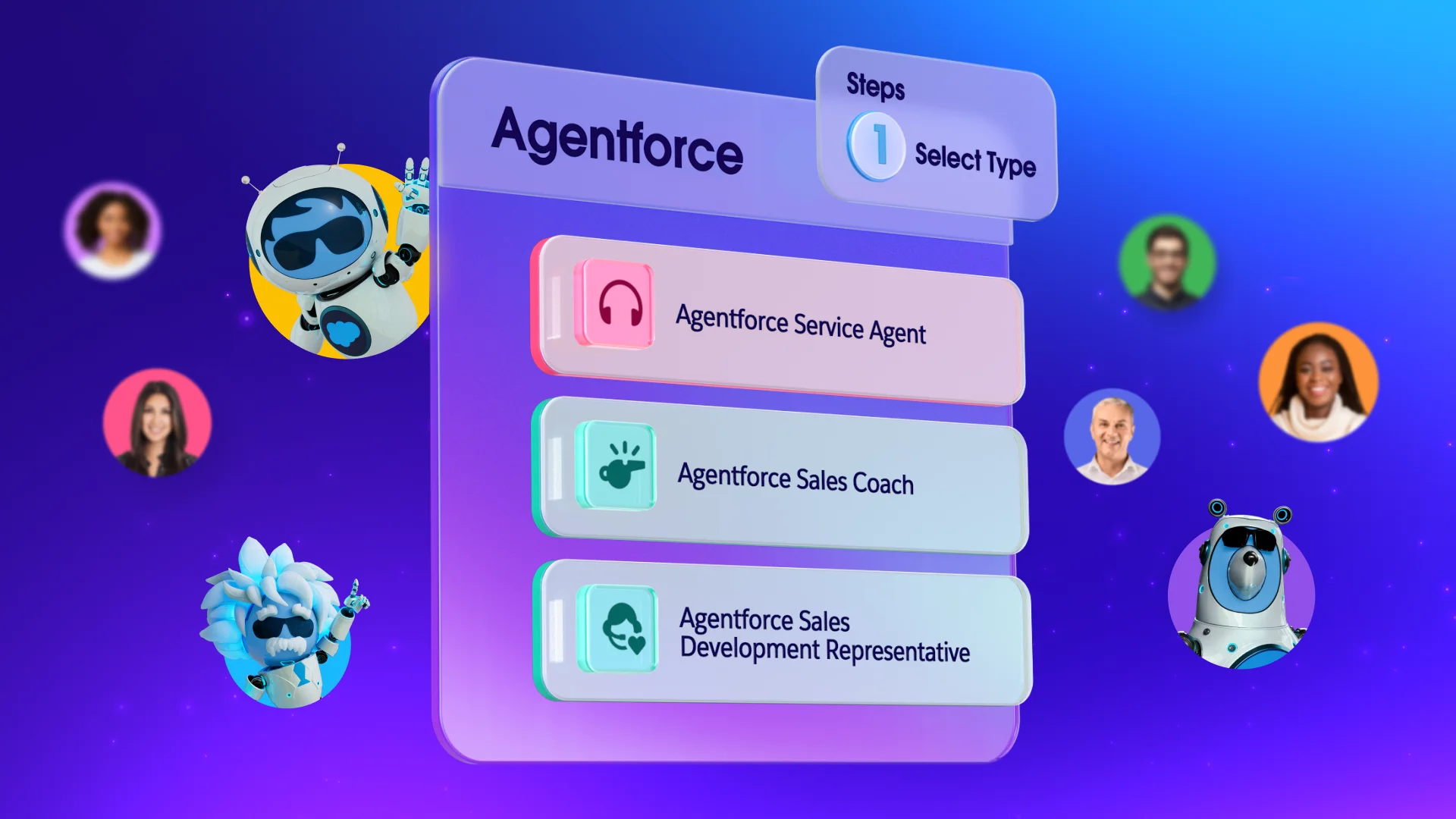
Bringing it all together with Agentforce 360
Most small teams don’t need more tools; they need more time. And one way to keep moving without burning out is to use a CRM with agentic AI. All these use cases have one thing in common: they have AI that’s taking action. And, you can too.
Agentforce 360 is how Salesforce brings business to life. It’s a built-in layer of agentic AI that works inside your CRM and across your business. It helps you follow up with leads faster, keep systems updated, support customers around the clock, and automate tasks that normally take hours.
Start your journey with Starter Suite. Looking for more customization? Explore Pro Suite. Already a Salesforce customer? Activate Foundations and try out Agentforce 360 today.
AI supported the writers and editors of this article.
